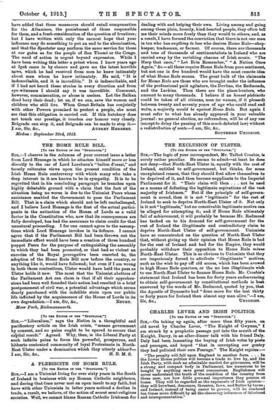THE EXCLUSION OF ULSTER.
[To THE EDITOR OF THE "SPECTATOR."] SIR,—The logic of your correspondent, Mr. Talbot Crosbie, is surely rather peculiar. He seems to admit—at least he does not deny—that North-East Ulster is, equally with the rest of Ireland, entitled to self-government, but thinks, for some unexplained reason, that they should first allow themselves to be deprived of it, and then become suppliants to the Imperial Parliament for it. " Their claim will then . . . not be used as a means of defeating the legitimate aspirations of the vast majority of Irishmen." But if the principle of self-govern- ment is sound, then it is not " legitimate " for the rest of Ireland to seek to deprive North-East Ulster of it. Not only is it not "legitimate," but no conceivable legitimate motive can be alleged for attempting it; and if Home Rule ultimately fail of achievement, it will probably be because Mr. Redmond has tacked on to his demand for self-government for the rest of Ireland the illegitimate and contradictory claim to deprive North-East Ulster of self-government. Unionists have so concentrated on the question of North-East Ulster that, without giving up their opinion that Home Rule is bad for the rest of Ireland and bad for the Empire, they would probably withdraw their opposition to Home Rule minus North-East Ulster. This is so obvious to Unionists that they are imperiously forced to attribute "illegitimate " motives, such as the wish to pay off old scores, which has been avowed in high Home Rule quarters, or the no less illegitimate wish to use North-East Ulster• to finance Home Rule. Mr•. Crosbie's statement that Ireland has been for forty years endeavouring to obtain self-government by constitutional methods is best answered by the words of Mr. Redmond, quoted by you, that the Apostle of Dynamite had "done more for• the last thirty or forty years for Ireland than almost any man alive."—I am,


































































 Previous page
Previous page